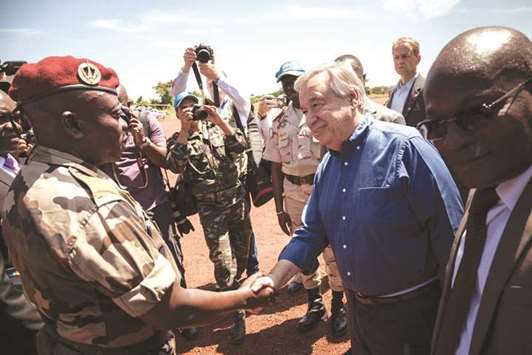UN chief Antonio Guterres arrived yesterday in the strife-ravaged town of Bangassou for a first-hand look at a notorious hotspot in Central African Republic’s bloody conflict.
Guterres, making his first visit to one of Africa’s most troubled countries since he took the UN helm in January, stepped off a plane from the capital Bangui, where he arrived Tuesday.
Mineral-rich but extremely poor, CAR has been battered by a three-year conflict between rival militias that began after the then president, Francois Bozize, was overthrown.
Acting under a UN mandate, the former colonial power France intervened militarily to push out the Muslim Seleka rebels who had taken over, and the United Nations launched a peacekeeping mission in 2014.
But the country remains unstable and mired in violence, and the role of the UN peacekeepers is under cold scrutiny.
Thousands have lost their lives and half a million people have been displaced out of a population of roughly 4.5mn.
After a visit of several hours in the southeastern city, Guterres was to return to Bangui to talk to victims of sexual abuse by UN peacekeepers — part of an effort to address damaging allegations that have hit the blue helmets in several missions — and representatives of NGOs.
CAR has become one of the most dangerous countries in the world for humanitarian groups to work.
Guterres’ trip comes in the context of a looming decision by the UN on whether to renew the mandate, which expires next month, of its 12,500-troop peacekeeping force. He is lobbying for the mandate to be renewed and for an additional 900 troops.
On the first day of his visit, which coincided with United Nations Day, Guterres led a wreath-laying service in honour of peacekeepers killed in action.
“There is nothing more precious than peace. There is nothing more noble than working to maintain peace, even if the work means sacrificing lives,” he said.
“The international community is not involved enough, has not provided enough of its financial resources and its capabilities to help the Central African Republic,” he said.
Bangassou, a pre-dominantly Christian town of 35,000 people around 700km east of Bangui, has been one of the worst-hit areas for violence.
Seventy-six civilians and six MINUSCA troops were killed after a so-called self-defence militia, known as the anti-balaka, mounted an assault on May 13 on other armed groups, either pro-Moslem or drawn from the Fula ethnic group.
Today, with occasional gunfire routinely heard in the background, economic activity in the town has all but evaporated.
The police, courts, prefecture and customs buildings are all deserted and starting to be invaded by weeds.
The local radio station has closed down, and the anti-balaka ordered the local Tokoyo market to close, saying those who continued to do business there “would meet with death.”
The only cars on the streets are those from MINUSCA, the office of the local Catholic archbishop and Doctors without Borders, MSF. A few motorbike taxis also circulate, but avoid “complicated” areas and at night the streets are completely deserted as people lock themselves in their homes.
Access to the river Mbomou, on the border with Democratic Republic of Congo is controlled by young, gun-wielding militiamen, many of them locals, and often drunk.
A self-described anti-balaka general, “BereBere,” in recent remarks to AFP, said: “If the war has to last 15 years, we will fight. And if we have to destroy Bangassou, we will destroy Bangassou.”

United Nations Secretary-General Antonio Guterres shakes hands with a UN officer on the tarmac of the Bangassou airport.
